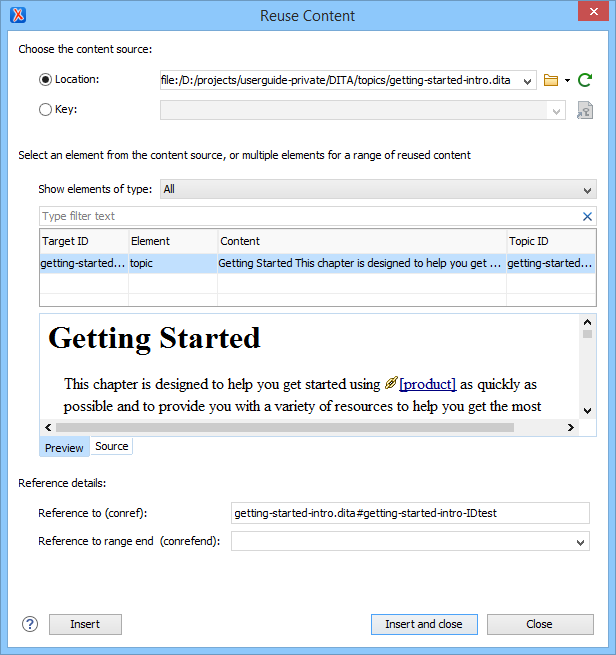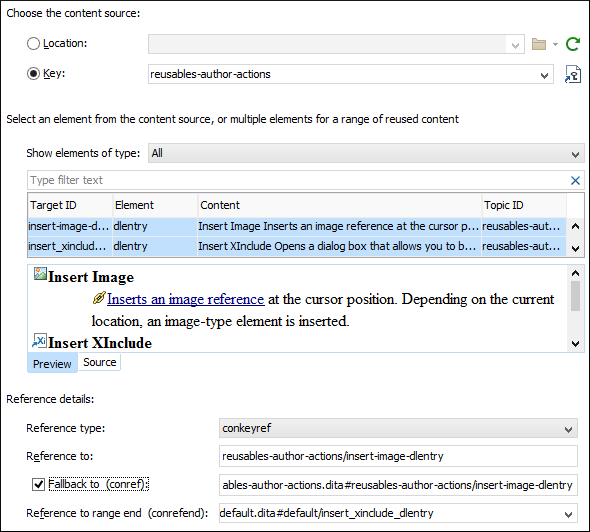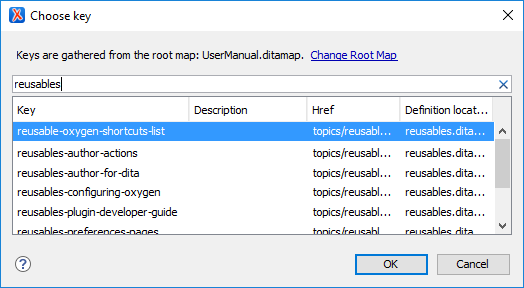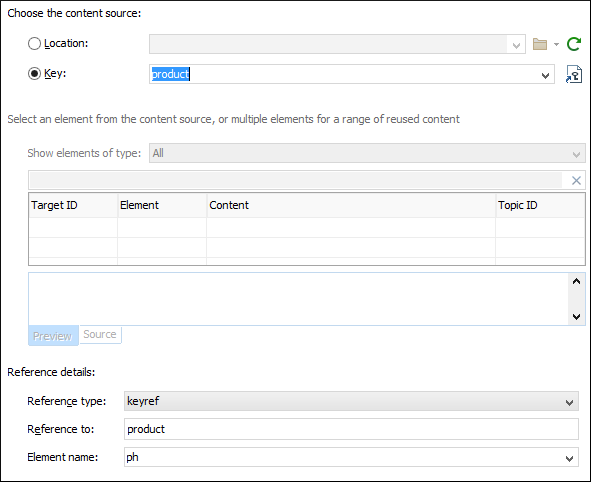Reuse Content Dialog Box
The Reuse Content dialog box provides a mechanism for reusing content
fragments. DITA @conref, @conkeyref, and
@keyref attributes can be used to insert references to reusable content. The
@conref attribute stores a reference to another element and is processed to
replace the referencing element with the referenced element. The @conkeyref
attribute uses keys to locate the content to reuse
rather than direct references to the topic that contains the reusable content. The
@keyref attribute also uses keys
and can be used to indirectly reference metadata that may have different values in various
circumstances.
@id attribute assigned to it. The element
containing the content reference acts as a placeholder for the referenced element. For more
details about DITA @conref and @conkeyref attributes, go to
https://www.oxygenxml.com/dita/1.3/specs/archSpec/base/conref.html.@keyref, keys are defined at map level and
referenced afterward. For more information about the DITA @keyref
attribute, go to https://www.oxygenxml.com/dita/1.3/specs/langRef/attributes/thekeyrefattribute.html.Oxygen XML Editor displays the referenced content of a DITA content reference if it can resolve it to a valid resource. If you use URIs instead of local paths in your XML documents and your DITA-OT transformation needs an XML Catalog to map the URIs to local paths, you need to add the catalog in Oxygen XML Editor. If the URIs can be resolved, the referenced content is displayed in Author mode and in the transformation output.
@conref, @conkeyref, or @keyref) can easily
be inserted at the cursor position by using the Reuse Content dialog
box. It can be opened with any of the following methods:- Click the
 Reuse
Content action on the main toolbar.
Reuse
Content action on the main toolbar. - In the contextual menu of the editing area, go to .
- Go to .
Your selection at the top of the dialog box for choosing the content source determines
whether Oxygen XML Editor will insert a @conref,
@conkeyref, or @keyref.
If you select Location for the content source, a content
reference (@conref) will be inserted. If you select
Key for the content source, keys will be used to insert a content
key reference (@conkeyref) or a key reference
(@keyref).
Content Reference (@conref) Options Using the Reuse Content Dialog
Box

Choose the content source Section
When Location is selected for the content source, a content
reference (@conref) will be inserted. Here you can specify the path of
the topic that contains the content you want to reference.
- Select an element from the content source Section
-
- Show elements of type
- You can use this drop-down list to select specific types of elements to be displayed in the subsequent table. This can help you narrow down the list of possible source elements that you can select.
- Text Filter Field
- You can also use the text filter field to narrow down the list of possible source elements to be displayed in the subsequent table.
- Element Table
- Presents all the element IDs defined in the source topic. Use this table to select the Target ID of the element that you want to reference. You can select multiple contiguous elements to reference a block of content.
- Preview Pane
- Displays the content that will be references. If you select multiple elements in the element table, the content from all the selected elements is displayed.
- Source Pane
- Displays the source code of the element to be referenced.
- Reference details Section
-
- Reference to (conref)
- Oxygen XML Editor automatically fills this text field with the value of
the
@conrefattribute to be inserted. However, you can edit this value if need be. - Reference to range end (conrefend)
- If you select multiple elements (of the same type) in the element table, Oxygen XML Editor automatically fills this text field with the
@idvalue of the last element in your selection. This value will be inserted as a@conrefendattribute, defining the end of the conref range.
Content Key Reference (@conkeyref) Options Using the Reuse Content
Dialog Box

Choose the content source Section
 Choose Key Reference
button to open the Choose Key dialog box that allows you to select one
from a list of all the keys that are gathered from the root map (you can also select one from the drop-down list in the
Key field).
Choose Key Reference
button to open the Choose Key dialog box that allows you to select one
from a list of all the keys that are gathered from the root map (you can also select one from the drop-down list in the
Key field).
- Change Root Map - Opens a small dialog box that allows you to select a root map.
- Search Filter - You can enter text in the filter field at the top of the dialog box to filter the list and search for a specific key.
- Sortable Columns - The dialog box includes the following columns that can be
sorted by clicking on the heading:
- Key - The name of the key (the value of the
@keysattribute). - Description - The description of the key that is obtained
from its definition. Keys that are defined with a text value in the
<navtitle>or<keyword>element have that value listed in this column. - Href - Keys that are defined with a value in an href attribute have that href value listed in this column.
- Definition Location - The name of the DITA map where the key is defined.
- Key - The name of the key (the value of the
- Group by Definition Location - A contextual menu action that can be used to group (and sort) all the keys based upon the value in the Definition Location column.
To insert a content key reference (@conkeyref), select the key that
contains the content you want to reference. Notice that the file path is shown in the
Href column. Keys that do not have a value in the
Href column are for referencing metadata with a
@keyref attribute. Therefore, to insert a @conkeyref, you
need to select a key that does have a value (file path) in the Href
column.
After you select a key, click OK to return to the Reuse Content dialog box.
When a key that is defined as a content key reference has been selected, the
Reuse Content dialog box offers the following additional options
for inserting a @conkeyref:
- Select an element from the content source Section
-
- Show elements of type
- You can use this drop-down list to select specific types of elements to be displayed in the subsequent table. This can help you narrow down the list of possible source elements that you can select.
- Text Filter Field
- You can also use the text filter field to narrow down the list of possible source elements to be displayed in the subsequent table.
- Element Table
- Presents all the element IDs defined in the source topic. Use this table to select the Target ID of the element that you want to reference. You can select multiple contiguous elements to reference a block of content.
- Preview Pane
- Displays the content that will be references. If you select multiple elements in the element table, the content from all the selected elements is displayed.
- Source Pane
- Displays the source code of the element to be referenced.
- Reference details Section
-
- Reference type
- The type of reference that will be inserted. If you selected a key that references a DITA resource, you will notice that conkeyref value is automatically selected.
- Reference to
- Oxygen XML Editor automatically fills this text field with the value of
the
@conkeyrefattribute to be inserted. However, you can edit this value if need be. - Fallback to (conref)
- You can select this option to define a
@conrefattribute to be used as a fallback to determine the content reference relationship if the specified conkeyref cannot be resolved. - Reference to range end (conrefend)
- If you select multiple elements (of the same type) in the element table, Oxygen XML Editor automatically fills this text field with the
@idvalue of the last element in your selection. This value will be inserted as a@conrefendattribute, defining the end of the conkeyref range.
Key Reference to Metadata (@keyref) Options Using the Reuse Content
Dialog Box

Choose the content source Section
 Choose Key Reference
button to open the Choose Key dialog box that allows you to select one
from a list of all the keys that are gathered from the root map (you can also select one from the drop-down list in the
Key field).
Choose Key Reference
button to open the Choose Key dialog box that allows you to select one
from a list of all the keys that are gathered from the root map (you can also select one from the drop-down list in the
Key field).
- Change Root Map - Opens a small dialog box that allows you to select a root map.
- Search Filter - You can enter text in the filter field at the top of the dialog box to filter the list and search for a specific key.
- Sortable Columns - The dialog box includes the following columns that can be
sorted by clicking on the heading:
- Key - The name of the key (the value of the
@keysattribute). - Description - The description of the key that is obtained
from its definition. Keys that are defined with a text value in the
<navtitle>or<keyword>element have that value listed in this column. - Href - Keys that are defined with a value in an href attribute have that href value listed in this column.
- Definition Location - The name of the DITA map where the key is defined.
- Key - The name of the key (the value of the
- Group by Definition Location - A contextual menu action that can be used to group (and sort) all the keys based upon the value in the Definition Location column.
To insert a key reference to metadata (@keyref), select the key you
want to reference. Keys that do not have a value in the Href column
are for referencing metadata with a @keyref attribute. Therefore, to insert
a @keyref, you need to select a key that does not have a value (file path)
in the Href column.
After you select a key, click OK to return to the Reuse Content dialog box.
@keyref:- Select an element from the content source Section
- This section is not used when referencing metadata.
- Reference details Section
-
- Reference type
- The type of reference that will be inserted. If you selected a key that does not reference a DITA resource, you will notice that keyref value is automatically selected.
- Reference to
- Oxygen XML Editor automatically fills this text field with the value of
the
@keyrefattribute to be inserted. - Element name
- Oxygen XML Editor automatically selects the element that is most commonly used for the selected type of key reference, but you can use the drop-down list to choose another element to use for the reference.

 Reuse
Content
Reuse
Content